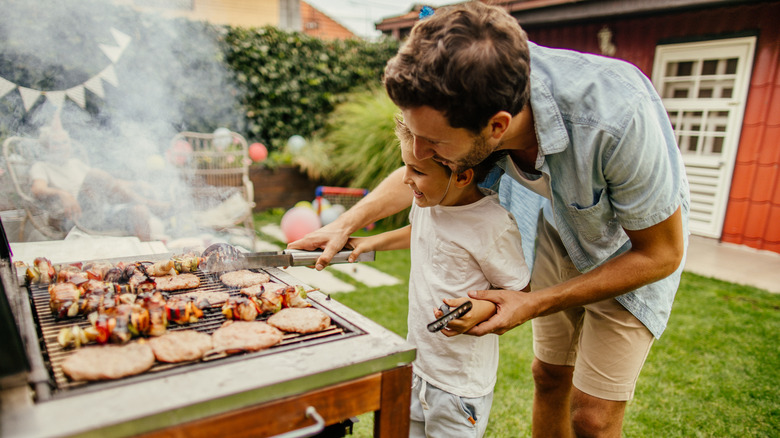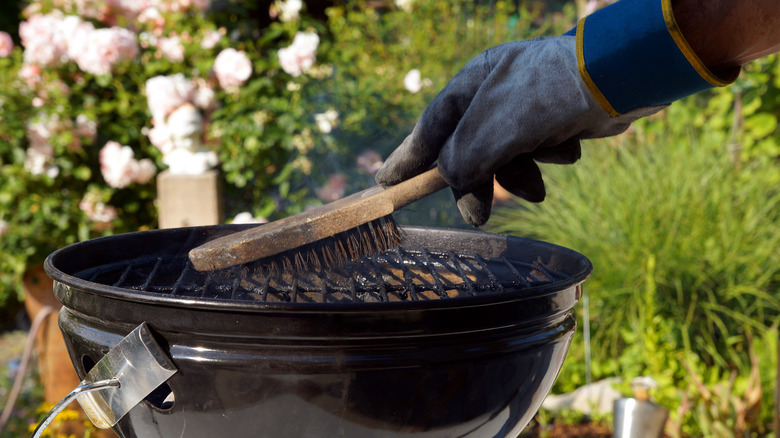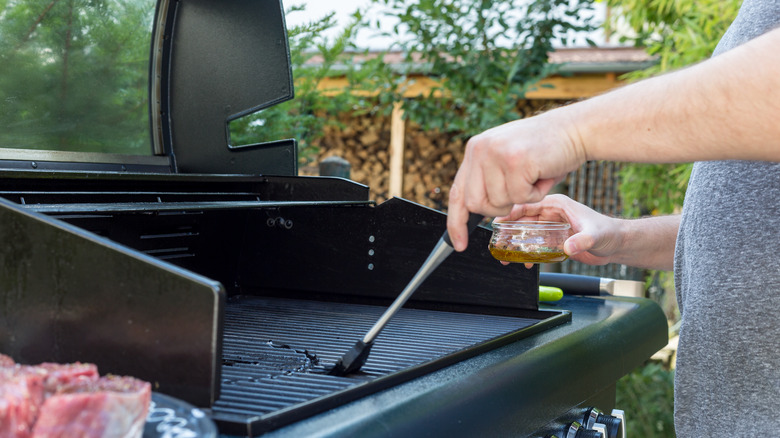The 3 Essential Steps To Know For Safe Barbecuing
Chef-approved grill tips can help you become a grill master, but food safety is equally important when cooking steaks, burgers, and chicken. In this case, there is a three-step maintenance and cleaning process you can employ to reduce the chance of foodborne illness. It involves preheating the grill, brushing food debris from the grates, and applying oil to make the next round of maintenance a whole lot easier.
Pre-heating the grill has two essential purposes when it comes to cleanliness. First, it helps kill off some of the bacteria that's accumulated since your last barbecue-fest. Second, it makes it easier to remove the lingering food debris, which can form an incredibly tight bond with the grill grates. It's estimated that a typical grill harbors millions of microbes, making the popular cooking appliance more bacteria-laden than a toilet seat. Along with the bacteria resulting from remaining food debris, it can also attract wildlife looking for a quick bite to eat, which can then spread bacteria of their own. (So always close the lid before calling it a night.)
Brush your way to a safer grill
It's best to allow a grill to pre-heat for about 10 to 15 minutes, then break out your handy grill brush and get to work. Brushes with flexible bristles are usually best when cleaning grates, especially those with scrapers, which can be used to address particularly tough stuck-on food. Longer handles with angular designs are also preferred, as they can help you access tight, awkward spaces.
Don't wait too long before brushing the grill grates after pre-heating, as food will be easier to remove at a high temperature. To prevent burns, it's best to brush the grates of a grill while wearing a reliable pair of grilling gloves. These gloves should be resistant to high temperatures while also offering a bit of flexibility, which will make it easier to move your fingers and hands while cleaning. Wondering how often to clean a grill? The appliance should be heated and thoroughly brushed after every use.
Oiling grill grates makes your life easier
With the proper heating and scraping, you now have clean, pristine grates just begging for a tasty recipe, such as grilled skirt steak with chimichurri. Before you begin cooking, don't forget the third and final step in your grill maintenance strategy. Applying oil to the grates stops food from becoming stuck in the first place, which will make your next scrub session a lot easier. Be careful when applying oil if the grates are still hot. Either wait for them to cool down, or use your grill gloves as you brush oil on the grates.
When choosing oil for your grill grates, smoke point is a key concern. Options like vegetable or canola are excellent, as these oils have a high smoke point. That means they won't burn on the grill and release unpleasant aromas. Steer clear of extra virgin olive oil or unrefined sunflower oil, because they have a low smoke point and are likely to burn when coming in contact with high temperatures. Properly caring for your grill not only preserves the appliance but also helps to prevent a potentially unpleasant bout of food poisoning.


